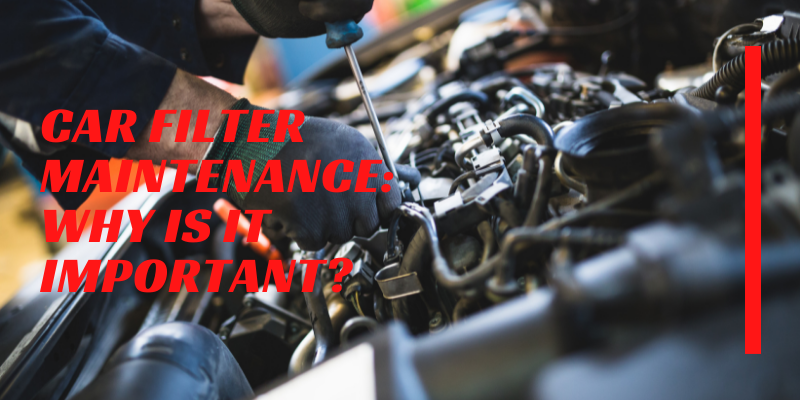Car Filter Maintenance: Why is it Important?

Knowing the lifespan of the car filter in your vehicle is crucial. For instance, oil and fuel filters (and many other filter types) in engines are replaced well before they reach the end of their lifespan. Car owners must regularly check for dirty or clogged filters to be replaced in order to avoid severe car damage.
A car's air filter cannot be taken for granted either. The air your car needs to breathe is filtered through this part so it can do its job well. Without it, dirt will go under the hood and might cause expensive repairs later on, so it is best not ignored by regular inspection and replacement if needed.
With good care, the life of the Filter would be prolonged.
Cars require regular filter-renewal to keep engines running clean and free of any hydrocurioses like metal particles. Filters catch contaminants like dirt and water mixture. This can also increase fuel efficiency, making better use out of intake air, which leads to lowering emissions for our environment by up to 3%. By replacing your old filters with new ones regularly or even every three months will go a long way in providing premium SUV experience to you and your loved ones
Regular car filter maintenance is one of the most important ways of maintaining a healthy, pleasant driving experience. Learn more about the correct frequency to replace your filters with this guide.
Car filters work to ensure clean air, ensure clean fuel, and cooling effect on the engine. When your car’s filter media becomes old or non-functioning it has an adverse effect on your vehicle affecting all three of the features above.
There are several reasons why car filter maintenance is important. It ensures that the engine of the vehicle lasts long, reduces the risk for dirt particles to be blown into your lungs, reduce hay fever symptoms during hay fever season.
The most common risk that you are taking if you neglect your filter maintenance is that it can cause irreversible damage to your vehicle. A dirty or clogged up engine can lead to more frequent repairs, repairs might cost more money and they might be more difficult.
Fuel Filters
In a fuel-injected engine, a fuel filter catches dirt and debris in the gas before it reaches the throttle. It's important to change or clean your filter regularly because that compromises performance and can damage delicate engine components.
So when should you change your car's fuel filter? Anytime when it’s in need of a replacement will suffice. Typically, if you start noticing a lack in performance in either acceleration or top speed, change the filter immediately.
In most cases, replacement or cleaning can take an average of 30 minutes to complete for cars ranging from small models to SUVs.
Car fuel filter plays a vital role in the car. It is in charge of removing dirt and other foreign substances that come into contact with the car in air intake.
Its primary function is to keep contaminants in the fuel system down to optimal levels.
The material of Car Fuel Filter varies depending on the manufacturer, location, and type of vehicle since they are not all made equally. But they usually feature an assembly of physical materials, gas pressure absorbing rubber membranes, metal mesh screens, perforation caps, and an outside air-pressure sensing diaphragm or sensor tube. These features work together to promote high performance even with harsh driving conditions.
A fuel filter is an essential part of the gas delivery system. It helps to separate impurities from the fuel. Water, sediment, bits of dirt and rust all get filtered up along with contaminants like wax that is hard for it to get past.
A fuel filter should be replaced or refurbished when it starts to degrade or doesn’t function properly. You usually have some sort of service indicator on your instrument panel that will tell you when it’s time for this maintenance procedure. Nonetheless, there are some signs you can check on your car to figure out if your car’s CFP needs some fresh fuel flow through it- especially if you are driving an older model that lacks these indicators in the dash cluster screen.
Air Filters
The purpose of an air filter is to filter out dust, dirt, smoke, pollen, and other contaminant particles from the air passing through the system. Serviceable filters are designed to have some form of activated carbon or similar adsorptive material on their outer surfaces that correspondingly provide a degree of filtering for some vapors and odor-causing compounds emitted by gasoline engines.
The specifics of servicing will depend on the type of air filter used in your vehicle. For most automobiles, passenger compartment filters are replaced each time new oil is changed or every 12 months.
For engine intake filters, these are more complex devices with wick assemblies or activated charcoal components which must be changed periodically according to manufacturer's service specifications.
A carbon air filter serves the purpose of trapping dirt and debris in order to prevent dirty air from contaminating the rest of the vehicle. It catches airflow coming out of the engine before it enters the inside of your car. If you want to keep your car’s engine running smoothly, you should replace your car's air filter on a regular basis. According to General Motors, GM recommends that an average sized car be serviced every 10,000 miles. Some filters already come pre-oiled or with prepackaged oil, but other models will need to be lubricated with grease for this step.
Oil Filter
Oil filters clean oil and remove impurities from fuel to protect an engine from combustion byproducts that may be damaging.
The only two types of oil filters that we need to be concerned about range from paper and nylon, and micro and spin-on.
Oil filter systems generally need periodic maintenance, but if your car relies on air instead of an oil pump for fuel pressure, this work should be done at the same time as your spark plug change, at around 60-75 thousand miles.
There are three types of oil filters. There is paper-type of filter, sponge type of filter, and the secondary type of filter. To maintain the paper-type oil filters you need to replace them after 1000 kilometres.
To maintain sponge type oil filters it has to be changed out after every 5000 kilometres.
Lastly for secondary filters, it has to be replaced with 20,000 kilometres or sooner if there are any changes in the engine's performance.
Do i change my car filter by myself?
It's no wonder that people are doing their own maintenance. If you have the time, it is worth considering DIY car filter replacement in case you know what you are doing.
1) But why should I go through the effort then? Couldn't I just pay a mechanic to do it?
Self-explanatory answer: You have biases about spending money where a cost-benefit analysis indicates that it is not worth paying for. Mind your wallet and see if a DIY mechanic will work for you, depending on your level of industriousness and spousal support from those from whom you live under.
2) What if my hands shake or if i don't know how to dremel?
Then employ someone! This task will be much less expensive than your insurance premiums.
What are car filters made of?
There are three primary types of car filters: paper, cellulose, and oil. While each have their own specific uses, paper is the most common type used.
Paper filters are primarily made from paper textiles or cellulose fibers which capture airborne particles by filtering them through hundreds of layers of microscopic pores. Paper is naturally hydrophobic so there is no need for chemical treatment to help remove particulates in water.




